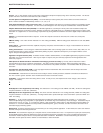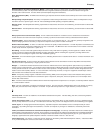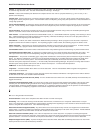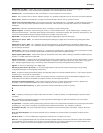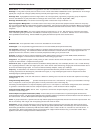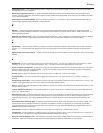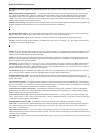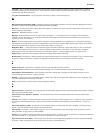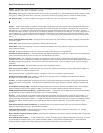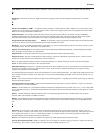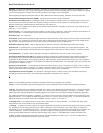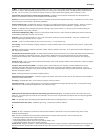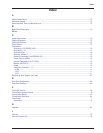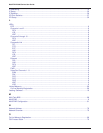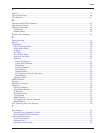
90
MultiFRAD 3000-Series User Guide
Outage: The measure of the time during which a circuit is not available for use due to service interrupt. Outage is the complement of
circuit "availability" (100% minus % available = % outage).
Out-of-band: Signaling that is separated from the channel carrying the information (i.e., the voice/data/video signal is separate from the
carrier signal). Dialing and various other "supervisory" signals are included in the signaling element. Contrast "In-band" signaling.
Out of Frame (OOF): A T1 alarm condition that is logged on the loss of 2, 3 or 4 of 5 consecutive FT framing bits.
P
Packet: 1. In data communication, a sequence of binary digits, including data and control signals, that is transmitted and switched as a
composite whole. The data, control signals and, possibly, error control information are arranged in a specific format. 2. Synonymous
with data frame. 3. In TCP/IP, the unit of data passed across the interface between the Internet layer and the link layer. A packet
includes an IP header and data. A packet can be a complete IP datagram or a fragment of an IP diagram. 4. In X.25, a data transmis-
sion information unit. A group of data and control characters, transferred as a unit, determined by the process of transmission. Com-
monly used data field lengths in packets are 128 or 256 bytes. 5. The field structure and format defined in the CCITT X.25 recommen-
dation.
Packet Assembler/Dissembler (PAD): Used by devices to communicate over X.25 networks by building or stripping X.25 information
on or from a packet.
Packet Data: The information format ("packetized") used for packet-mode calls.
Packet Mode: Refers to the switching of chunks of information for different users using statistical multiplexing to send them over the
same transmission facility.
Parity bit: An extra bit attached to each byte of synchronous data used to detect errors in transmission.
Permanent Virtual Circuit (PVC): A connection between two endpoints dedicated to a single user. IN ISDN, PVCs are established by
network administration and are held for as long as the user subscribes to the service.
Physical Unit (PU): The component that manages and monitors the resources (such as attached links and adjacent link stations)
associated with a node, as requested by an SSCP via an SSCP-PU session. An SSCP activates a session with the physical unit in order
to indirectly manage, through the PU, resources of the node such as attached links. This term applies to type 2.0, type 4, and type 5
nodes only.
Point of Presence (POP): The central office's end points of the long distance carriers.
Point to Point Protocol (PPP): A protocol that lets a PC user access TCP/IP (Internet member) using an ISDN terminal adapter or a
high-speed modem over a standard telephone line.
Port: A location for input or output data exchange. Computers, muxes, etc. have ports for various purposes.
Primary Rate Interface (PRI): Used on ISDN. In North America, and Japan, PRI is one 64Kbps D channel and 23 B channels.
Elsewhere, it is one D channel and 30 B channels.
Primitive: An abstract representation of interaction across the access points indicating that information is being passed between the
service user and the service provider. The OSI Reference Model defines four types of primitives: Request, Indication, Response and
Confirm.
Private Branch Exchange (PBX): A telephone exchange located on the customer's premises. The PBX provides a circuit switching
facility for telephone extension lines within the building, and access to the public telephone network. See also "Exchange".
PROM (Programmable Read Only Memory - pronounced "prom"): A permanent memory chip that can be programmed or filled by
the customer after by the manufacturer has set initial values. Contrast with ROM.
Protocol: 1. A set of semantic and syntactic rules that determines the behavior of functional units in achieving communication. 2. In
Open Systems Interconnection architecture, a set of semantic and syntactic rules that determine the behavior of entities in the same
layer in performing communication functions. 3. In SNA, the meanings of and the sequencing rules for requests and responses used for
managing the network, transferring data, and synchronizing the states of network components. 4. Synonymous with line control
discipline.
PSTN (Public Switched Telephone Network): A worldwide public voice telephone network that is used as a telecommunications
medium for the transmission of voice, data and other information.
Public Data Network (PDN): A packet-switched network that is available to the public for individual ("subscriber") use. Typically,
controlled by a government or a national monopoly.
Public Switched Telephone Network (PSTN): The group of circuit-switching voice carriers, which are commonly used as analog data
communications services.
Pulse Code Modulation (PCM): 1. In data communication, variation of a digital signal to represent information; for example, by means
of pulse amplitude modulation (PAM), pulse duration modulation (PDM), or pulse position modulation (PPM). 2. Transmissions of
analog information in digital form through sampling and encoding the samples with a fixed number of bits.



